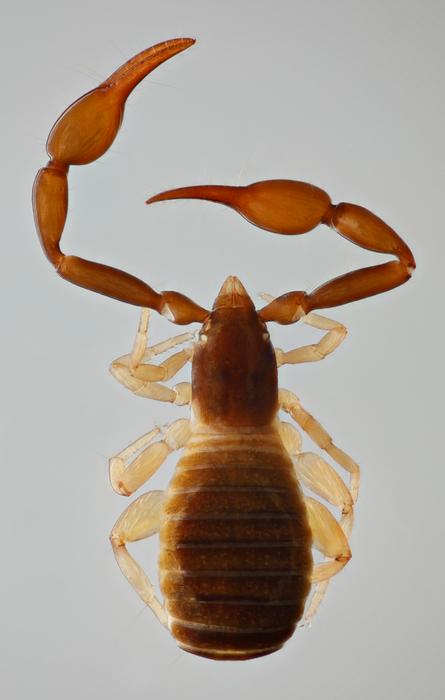There are about 25,000 islands in the Pacific Ocean. The most remote of them are in North and East Polynesia, the Hawaiian Islands, and French Polynesia. Biologists have been attracted to these regions since the 18th century, but French Polynesia has received much less attention compared to the Hawaiian Islands.

Credit: Krajčovičová et al.
There are about 25,000 islands in the Pacific Ocean. The most remote of them are in North and East Polynesia, the Hawaiian Islands, and French Polynesia. Biologists have been attracted to these regions since the 18th century, but French Polynesia has received much less attention compared to the Hawaiian Islands.
Contributions to our knowledge of the pseudoscorpions of French Polynesia date from the 1930s and are associated with the Pacific Entomological Survey. Since then, the French Polynesian pseudoscorpion fauna has consisted of only four known species.
Thanks to international cooperation, a team of enthusiastic scientists has published the first discovery of a new species of pseudoscorpion from French Polynesia. Between 2017 and 2020, they studied French Polynesia’s fauna and environment for the French Polynesian Agricultural Service and as a part of a large-scale survey of arthropods. During their research work, they collected a few pseudoscorpion specimens on Huahine and Tahiti in the Society Islands.
Among them is a new species named Olpium caputi, collected by sieving moss at 1,450 m about sea level on the Mont Marau Summit, Tahiti, one of the Society Islands archipelago. Its scientific name honours s, the President of Slovakia.
“As a female leader, she takes a strong stance and supports women and scientists. Even in the 21st century, women in science or top positions are rare. The rarity of the research in French Polynesia, the uniqueness of the discovery, and the fact that the new species is a female, led us to name it after this inspiring woman who can be a role model of courage and perseverance for many women,” says Jana Christophoryová, who led the study.
The paper is published in the open-access, peer-reviewed journal ZooKeys.
The team:
Katarína Krajčovičová of Bratislavské regionálne ochranárske združenie – BROZ, Bratislava, and Jana Christophoryová of Comenius University, Bratislava, are both zoologists, who specialize in the taxonomy, distribution, and ecology of pseudoscorpions. Frédéric Jacq, botanist, and Thibault Ramage, entomologist, are independent naturalists who have been working on improving the faunistic and taxonomic knowledge of French Polynesia for over 15 years.
Research article:
Krajčovičová K, Ramage T, Jacq FA, Christophoryová J (2024) Pseudoscorpions (Arachnida, Pseudoscorpiones) from French Polynesia with first species records and description of new species. ZooKeys 1192: 29-43. https://doi.org/10.3897/zookeys.1192.111308
Journal
ZooKeys
DOI
10.3897/zookeys.1192.111308
Article Title
Pseudoscorpions (Arachnida, Pseudoscorpiones) from French Polynesia with first species records and description of new species
Article Publication Date
19-Feb-2024




